#Study Guide
Explore tagged Tumblr posts
Text
adhd study tips.
by a stem student with adhd.
disclaimer!!! I’m by no means an expert in mental health or adhd but I do happen to have it. My intention with this post is to help others with adhd get more comfortable with studying so the process will be smoother for them!! At the end of the day, despite having the same disorder our brains will still work differently so do keep in mind that these may or may not help you, but are something you can try out if you’re stuck on not being able to study efficiently.
here’s some adhd study affirmations + tips on straying from discouragement if you’re experiencing burnout.
(And here’s part 2 of adhd study tips.)
I’ll start this off by listing more commonly known study tips that also work well with adhd.
change up your environment every now and then. we seek novelty even more than neurotypical people already do so switching it up will definitely help in our studies, especially if the place is well lit!
try some questions of the topic you’re trying to learn even when you know nothing about it. both neurotypical and neurodivergent brains are hardwired to remember things when we are proven wrong, and this is a great way of utilizing this neurological response!
take walks, exercise or stretch during your breaks. this tip is very effective at satiating our hyperactivity and also keeps us energized throughout our study session.
keep a notebook for your brain dump / ideas. we always either think of really stupid things or the most brilliant ideas in the middle of our study sessions and it almost always leads to distraction, but writing it down somewhere lets your brain know that the idea isn’t going anywhere and you can continue studying.
now, onto the tips that have personally helped with my adhd (and I haven’t seen many others talk about.)
alternate between various study plans, routines, schedules and techniques and always be open to finding more of them. majority of the time people always say ‘have a routine that works for you and stick with it’ but our adhd brains get bored very quickly, especially when it comes to repeated routines and schedules. I personally never stick to the same routine or plan more than three days in a row and sometimes I even make a plan on the spot and I’ve been more productive doing that than when I had only one or two study routines to switch between.
do not time yourself at the very beginning. Instead, focus on something in your studies you’re interested in and start there. what do I mean by this? well, since starting is always the hardest, when we begin our very first pomodoro we might find ourselves spending the first 25 minutes zoning out on a textbook just to get that ‘study time’ in even though you didn’t actually learn or recall anything. So to combat this, begin with something you’re genuinely curious about, or ask a question you can’t help but wonder the answer to. Once you find the answer, you might find you’re more in the zone and can continue from there. If not, take a short break and begin the pomodoros afterwards.
if you’re zoning out while reading up on a topic, try walking around while reading, looking at different sources on it or do some questions on that topic. again, novelty always gets us every time. sometimes the problem may be that the explanation in front of you isn’t making sense in your head and other sources may phrase things in a way that is better for your understanding. perhaps the problem is that you’re staying too still and you need to satisfy the hyperactive part of your adhd. or maybe your brain subconsciously believes that they already know what needs to be known about this topic, and there’s no better way to test that by trying out some questions on it.
switch between lyrical and non-lyrical music playlists, but make sure the lyrical music inspires you to excel. this definitely won’t apply to a lot of people but I found that when I constantly listened to piano, lo-fi or just non-lyrical music while studying in general, it actually promoted my likelihood of zoning out. but recently I found a playlist I deeply resonated with that was related to my studies called, ‘pov : a try-hard mid student who wants to ace everything’ and because I related very deeply with both the title and the lyrics of the songs, I was actively being encouraged to study as I was studying. but I also recognize when I really need to think in certain areas and that’s when I switch back to the non-lyrical music.
this is all I have as of right now but please do lmk if you guys want more of these!! I really wanna help out as much people as possible because my studies suffered greatly due to both my adhd and my late diagnosis of it and I’d love to help out others going through something similar.
#stem#science#study tips#study#study hard#studyblr#studyinspo#study motivation#studystudystudy#studygram#study guide#study gram#adhd problems#adhd#actually adhd#adhd stuff#adhd things#adhd tips#living with adhd#adhd study tips#adhd student#adhd struggles
1K notes
·
View notes
Text
Let's suppose you want to learn Chinese mainly to read webnovels (or other reading material).
Now, personally, I recommend some study of pronunciation like pinyin, and watching some videos or reading some articles on tones and tone sandhi, grammar, hanzi and hanzi structure. Because at some point you'll probably want to listen too, speak too. So you know - use other resources to study the other skills! If you plan to do anything besides read eventually. Also, I think some pronunciation study actually helped me with remembering hanzi (the sound components in them) and reading skill.
But lets suppose you're studying mainly so you can read webnovels. Which is what I did in my first year. And you can set a goal to start reading webnovels within a year. For some people it takes as little as 3 months to start reading webnovels, for others like me it took around 6 months to start reading webnovels and 12 months to feel comfortable.
Download Pleco app and Readibu app. These apps will be your best friends. Pleco app is a dictionary tool so you can look up unknown chinese words, and it's Clipboard Reader area is where you can paste any chinese text into and then click-translate any words. I recommend the first time you look up any word, you press the dictate/speaker tool so you can hear how it's pronounced. You can save words in Pleco and study them using Pleco's built in SRS flashcards if you wish. Mainly though, the important part is using Pleco to look up words, read example sentences, and to use the Clipboard Reader area to read any Chinese text you find online. Pleco has an area to purchase graded readers, these will probably be some of the first things you read (if you choose to use paid resources). Readibu app is a click-translation Reader app for Chinese, you can browse the app for webnovels, or you can go to the Search area and paste in a url of a chinese webnovel, then Readibu will say it's not in the database so click 'search with Google' then you'll see the url as a result and click it, then bookmark the webnovel page in Readibu. From there you can click the open book icon on any webnovel, and it will make it just click-translate text and provide you the Readibu app features. Once you're reading a lot of webnovels, you may wish to use Readibu to read, for some people it will be more convenient than Pleco for going chapter by chapter.
Make a plan to start studying hanzi. I recommend you focus on the most common 1000-2000 chinese words, or the HSK 4 vocabulary, or both. The goal here is to get your vocabulary and hanzi recognition around HSK 4 level. I used this book (Tuttle Learning Chinese Characters: (HSK Levels 1 -3) A Revolutionary New Way to Learn and Remember the 800 Most Basic Chinese Characters) because it just clicked with me, I just read through it over a few months. You can use SRS flashcards (like Anki or Pleco) collections that people have made (I recommend this Mnemonics Simplified Hanzi Deck, or Mnemonics Traditional Hanzi Deck). For common words, I recommend Spoonfed Chinese anki deck (note it has some mistakes but I like that it has audio and sentence examples), but there's a ton of anki decks and common word frequency lists (you can genuinely just study a list) just pick a resource you like with either 2000 common words or HSK 4 vocabulary. Literally just pick any study materials where you can learn roughly 1000 common hanzi and 1000 common words or more. Whatever materials work for you. Study however you want - some people find anki flashcards useful (I just cram studied 1000 words for a few weeks each then never looked at anki again), some find books useful, some find textbooks useful, some use vocabulary lists, some use videos, just pick something. Your goal is going to be to study these words/hanzi in 3-6 months. 8-10 months if you want to wait to read longer, or need more time to study. I studied 800 hanzi in the book I linked for the first 3 months, then 1000 words the next month, then 1000 words the next month, then about 500 more hanzi the next month. It is okay to cram study! It is okay to not memorize these hanzi and words! Just get a basic familiarity! You are going to fully learn these common hanzi and words when you READ later.
As you are studying common hanzi and words, start reading a grammar guide if you would like some knowledge of grammar. Or watch some grammar videos on youtube, whatever clicks best with you. Basic Patterns of Chinese Grammar is a good grammar guide summary book, AllSetLearning Chinese Grammar Wiki is an excellent website you can read. I read another grammar guide summary, the website no longer exists. Again, do not try to memorize and drill this stuff, just go through it and get a basic familiarity. You can move on if a particular grammar point makes no sense right now. Learn about grammar the same time you're studying hanzi and common words, so the first 3-6 months.
Okay it's been 3 months! You know some hanzi (maybe 50-500), you know some words (maybe 50-1000 depending on how intensely you've been studying)! Start reading! You're going to start with Graded Readers, which are reading material made for learners. Heavenly Path's Comprehensive Reading Guide suggests some free graded reader resources in the Below 1000 characters section. I used Mandarin Companion Graded Readers and other graded readers I could purchase in Pleco. Mandarin Companion has some graded readers with 50 unique characters. I started with some Pleco graded readers that had 300 unique characters, then moved up to graded readers with 500-800 unique characters. Read graded readers! Reread them! Look up any words you don't know (using Pleco or something else). Listen to the pronunciation of any new words. If reading in Pleco, you can use the Dictation tool to hear the sentences read aloud. When using graded readers in general, use any audiobooks that accompany them. Mostly though just read, read, read, and look up anything you want. Look up grammar points in something like AllSetLearning Chinese Grammar Wiki if you are now starting to see some grammar that confuses you while reading. The reading practice is what is going to teach you the words you've been studying in other materials.
Now it's been 6 months. You've been working your way through graded readers of increasing unique character count (and are now reading graded readers of at least 800 unique characters or more). You've been working your way through studying common hanzi and words, and now have studied at least 1000 words or more. (If you cram like I did, you probably have studied over 2000 words but only the 800-1000 words in your graded reading material have been 'fully learned' and the other words you studied are only vaguely familiar, this is perfectly fine). Go to Heavenly Path and start reading the stuff they recommend for people who know 1000-2000 characters. I think @秃秃大王 by 张天翼 is perfect for people who know around 1000 characters to start with. You can keep reading some graded readers like those that go up to 1500-2000 unique characters if you'd like, but start trying to read novels for native speakers too. Again, I recommend anything in the easiest 'recommendations' from Heavenly Path's recommendation list of webnovels, a lot of novels for children will be perfect at this point. You'll gradually work on increasing the unique characters of your reading materials. Read in Pleco or Readibu so you can use the click-translate tool. To find webnovels online, paste or type the chinese name of the novel (and author if you know it), and then 'zaixian yuedu' like this '秃秃大王 张天翼 在线阅读'. It is very easy to find novels online in chinese.
From here you just continue reading more difficult novels! Go at the pace you choose! Once you're reading stuff with 2000 unique characters, then if you wish you can stop studying hanzi and common words outside of just looking them up in reading. You can of course continue to study hanzi and words outside of reading. But if you'd rather just learn words by looking them up as you read, you can start doing that as soon as you switch to novels for native speakers (1000-2000 characters). Congrats, you are reading webnovels!
Some people start reading webnovels within a few months, and you can start with a higher unique character count if you wish. Such as starting with MoDaoZuShi or Zhenhun or SaYe as soon as you go from graded readers to regular novels. The difficulty curve will be a lot steeper, and you'll be looking up a LOT of words for a while. But other people have done it. I started reading webnovels around 6 months, after doing graded readers for a while, and it took picking several easier and harder reading materials until I found a comfortable reading level to continue from.
So it boils down to: start studying very common words and hanzi (a list, a book, anki, whatever works for you, and you don't have to memorize just get some Exposure some Basic Familiarity), read about grammar if you wish (again just get some Basic Familiarity so later if you need to look up a grammar point in depth as you read, you know what to look up), and START READING ASAP. Use Pleco and Readibu to read with click-translations of words. Start with graded reader materials, then as soon as you can tolerate move on to novels for native speakers. Heavenly Path's website is a great resource for finding reading material at your level if you have no idea what to pick and don't want to trial and error different webnovels until something is doable. For anyone who finds sounds help with memory (like me) or who plan to eventually learn to listen to chinese, listen to the pronunciation of any new words when you look them up. If you watch cdramas, cdramas often have chinese subtitles on them, those can be good practice for reading as well.
You can start reading within a year. You can read graded readers within a few months, as soon as you feel it's tolerable. And then you can just learn new words BY reading, review words you've looked up before BY reading, review grammar BY reading, and work your way up to reading whatever webnovels you want. I find learning words BY reading much easier for myself, doing what I want to do in the language as I'm learning to read, much easier to stick to and enjoy than anki flashcards or word lists or textbooks. So from me, the suggestion to push yourself to read graded readers ASAP is so you can get to the part of learning BY reading quicker.
#chinese resources#rant#chinese reading#study guide#i am not sure what to tag this#chinese langblr#reading rec list#rec list
141 notes
·
View notes
Text

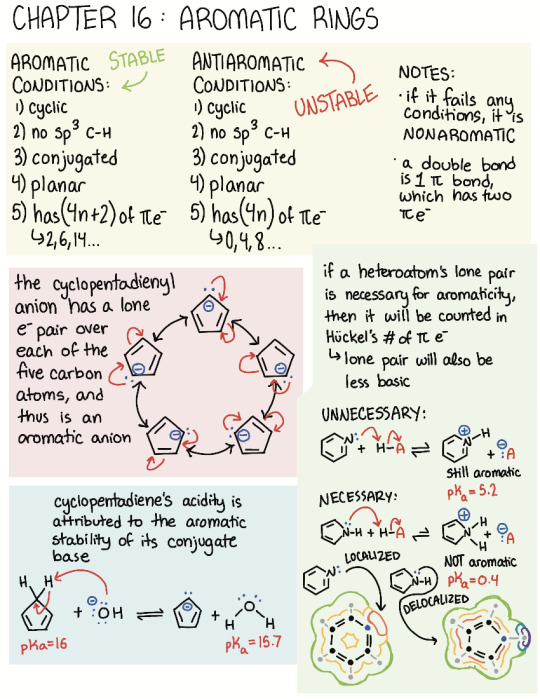


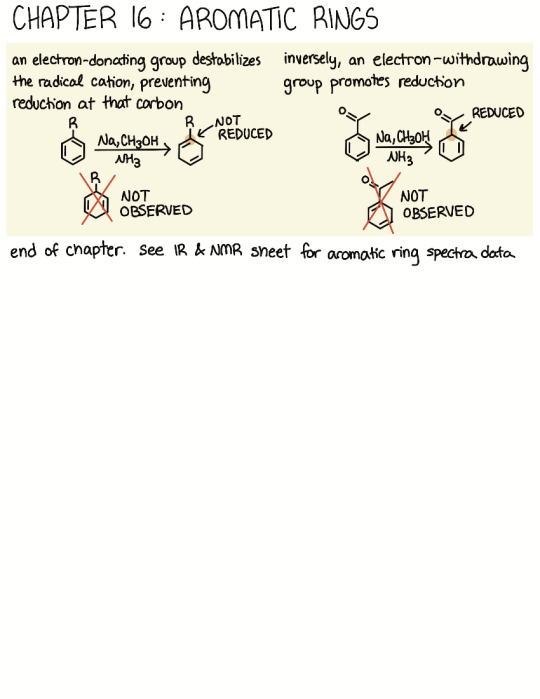
actually got an 80 on my orgo 2 midterm and it motivated me to finally start studying properly! so i'm already making study guides like a month before my next exam. if any of you are unlucky enough to be taking orgo 2 yourselves you're free to use them too :)
#positive reinforcement works so well LMAO#buzzing#buzzart#? i guess#buggie's nerd stuff#college#stem#organic chemistry#orgo#orgo 2#study sheet#study guide#aromatic#aromatic rings
47 notes
·
View notes
Text
Chemistry Notes (December 2021)
Acid-Base Equilibrium Side Ex 1
Acid-Base Equilibrium Side Ex 2
Arrhenius vs Bronsted-Lowry Acids and Bases
Calculating [OH-] with Kw Ex 1
Change in Entropy for a Change of State Ex 1
Classification of Amines
Complex Lewis Structure Formal Charges Ex 3
Constitutional Isomers Ex 1
Finding Percent by Mass Ex 2
Identifying Functional Groups Ex 2
Intermolecular Force of Water
Moles of Product Ex 1
Naming Cycloalkanes Ex 1
Naming Cycloalkanes Ex 9
Nonmetal Listing Order
Order of a Reaction Ex 2
pH from [OH-] Ex 1
Products of an Acid-Base Reaction Ex 1
R,S Naming of Fischer Projection Ex 1
Spin Quantum Number
Stereoisomers with Multiple Chiral Centers Ex 1
Stronger Acidity and Electronegativity Ex 1
Vanadium (III) Oxide
Weaker Acidity and Electronegativity Ex 1
Weaker Acidity and Electronegativity Ex 2
#studyblr#notes#chemistry#organic chemistry#mcat#mcat chemistry#mcat organic chemistry#study guide#study guides#study masterlist#masterlist#study masterpost#masterpost#study resources#orgo#organic chemistry notes#chemistry notes#studyblr notes#studyblr resources#isomers#isomerism#general chemistry#gen chem
362 notes
·
View notes
Text
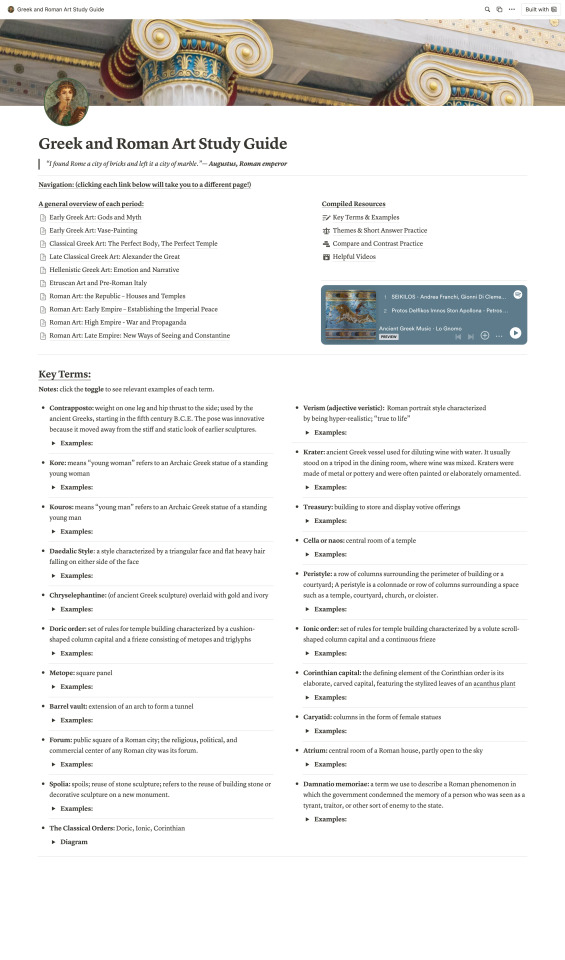
FREE | Greek and Roman Art Study Guide Notion Template
#art#art history#notion#notion template#free notion templates#studying#study aesthetic#study guide#greek mythology#greek art#roman art#roman#roman empire#ancient mediterranean art#mediterranean#mediterranean art#studyblr
124 notes
·
View notes
Text


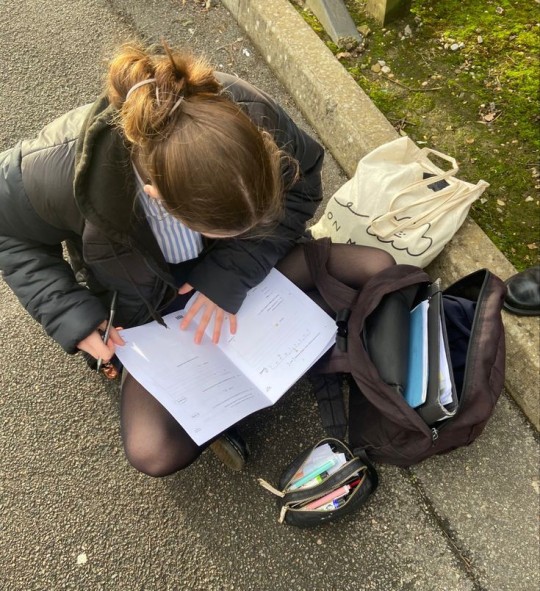

LOVE HER!
241 notes
·
View notes
Text
Last Chance for Questions on our Academic Research Guide!
At the beginning of the month, Writing With Color published A Beginner's Guide to Academic Research.
Some of you might have questions or comments about academic research, researching for creative writing, or the guide itself. How did we do? Did we miss anything? We will be going over your questions in a Q&A post in the coming days.
Please enter your questions in the notes of this announcement post here!
Share this post with anyone who might be looking for help researching for a creative project or for school!
We'll catch up with you soon.
- WWC Research Guide team
#guides#research#academic research#reference#resources#creative writing#writeblr#writing advice#school#study guide
274 notes
·
View notes
Text
Self / Independent Learner's Guide to Language Learning From Zero
-a mini study plan I used this for Spanish, French and Italian, it is my favourite way of starting to learn. It won't teach you the langauge but if this is your first time, if you feel confused and don't know where to begin, this is for you! -this is kinda romance langauge based but might give you ideas if you are learning from a different family too -this is very notebook / writing based since i prefer learning that way Step 1: Preperation
First of all, ask yourself "do i already have some amount of immersion in this langauge?" As humans, we learn from immersion a lot. Songs, but especially visual media is incredibly heplful. I never studied japanese but after watching a few animes i picked up 5-10 random words. Passive vocabulary, being familiar to most common words will be your biggest friend. If the answer is no, before start studying ANYTHING do some immersion. e.g. I watched dix pour cent for French and learned arrêt which means stop because characters were shouting to each other all the time.
After making sure you have some immersion or if you already have some, PREPARE YOUR RESOURCES. Make a file in your computer, reblog tumblr posts, save links. Search for pdfs in google. (x language a1 pdf / x langauge a1 grammar book / x language a1 reading) Free PDF's and and useful websites. The more the merrier. Why? Because when you actually start learning you will slowly realise them half of them are not actually useful, too advance, too simple, not in your preffered style etc. You will en up using same handful amount of resources again and again but before that, you have to TRY EVERYTHING. You are unique and so will be your learning process.
Google x language A1 curriculum. (you can try adding "pdf" at the end of sentence as well) It "probably/ hopefully" exists. If you can't find that way, learn which offical exam is necessary (e.g. for French it's DELF/DALF, in english there is IELTS and so many more) If you are lucky, you can find a langauge teaching enstitute's curriculum and you can find in what order they teach things. This was very helpful for me because sometimes you don't know what to study next, or just want to visualise what do you need to learn, it is helpful. I printed one out and paste it to the back cover of my notebook. You won't need this one YET. I'll explain in a second. Keep reading.
Get a notebook. I don't prefer books while learning from zero because it will be filled with vocabulary you don't know. My pereference is no squares no lines empty ass notebook and colorful pens. I'm a person of shitty doodles. I love to draw and visualise things. It really helps my brain. In A1, your knowledge is absouletly zero and your brain is about the explode with realising GREAT MASS of knowledge you need to learn in order to be "fluent" . So keep things away from being "too much" if you want to avoid a burnout.
Set a timer. If you want to avoid burnout, the secret is always quit when you feel like you can go another round happily. Quit when you are dopamine high. If you study too much, next day you'll wake up tired, want to rest etc. and make it harder for you to create a habit. I did this mistake with French by studying 4-5 hours everyday for around 30 days. I completed my challenge, completly quit and then didn't come back for MONTHS.
You will be re-studying A LOT. Language learning is repetition. You will start by studying "the A1 curriculum". But, because this is your first time your focus will be on the vocabulary and general comprehension. You are trying to re-wire your brain, and learn a different way of thinking and living. It's not easy. It will take time. It will be painful at times. But it is 100% worth it.
After you finished studying your curriculum, you'll take a short break and then study the curriculum AGAIN. For a second time. Because you already know the basics, this time you will be able to focus more on the little things you weren't able to comprehend the last time. e.g. articles or whatever little frustaring thing your langauge has. Also focus more on basic prononciation and especially reading aloud. Find a realistic text-to-reader. Copy-paste a text. Listen and repeat.
Get a new Youtube and Instagram account dedicated to langauge study. How many good resources exists and where they are is really depens on which langauge you are learning. For english, youtube is better. For French, instagram is better. You have to see for yourself. If you get a seperate account for your langauge algorith will learn faster and you won't be distracted by other stuff. Short form engaging videos are the best for absolute beginners. Re-watch things and try to repeat them out loud. It's called shadowing and is your future best friend.
If you want to learn how to speak, you first need to how to write. If you can't write sentences without looking at google translate (or reverso) you won't be able to make up sentences in your head. If you want to learn how to write, your first need to learn how to read. You need to start in this order but also don't be perfectionist. Do it even if you do it wrong. They will be fixed eventually and won't stick. Record yourself speaking even if the text you are reading is 90% google translated. Why? Beacuse speaking will enhance your vocabulary in a way no other thing can and that's the core of reading. So this isn't a linear thing. It's actually a circle!
Step Two! Ok, Sadie, i got my notebooks and read through all the warnings where do i start? *First page: [] means written is target langauge
[x notebook] x= your target langauge
Add something cute and make you feel happy to open up the notebook. It can a drawing, a picture, anything. First page is your entrance to your new home. Make it welcoming.
*[My name is X. I am Y years old. I live in Z.] *Greetings. Main articles if there are any. Yes, no, please, thank you. *What is your name, what do you do for living, how are you, where are you from, how old are you, how many langauges do you speak, numbers from 0-100. If there are multiple way of saying these things and probably there are, just write one. You will eventually learn others. Baby steps. *write a basic ass text of two people having a conversation asking and answering these questions.
*the alphabet and how to pronounce the letters. basic letter combinations that change into a different sound. a youtube video about this 100% exists.
*personal pronouns and if there is a "am/is/are" verb the conjugation of it. (in spanish there is two unfortunately) *artciles and basic noun endings. a couple exemples of nouns in x form but takes y article. *first 5 most common verbs. learn the conjugation, try writing basic ass sentences. (e.g. to come, go, have, speak)
*three more verbs (e.g. to eat, can, to want)
*take some time to fully comprehend. check your curriculum list to look and see if you want to add anything. e.g.for spanish that can be ser vs estar, for spanish is can be "how to ask questions in french" becaue it's way harder compared to other langauges.
*take some break from grammar and learn some vocab maybe. it can be colors, or feelings. (i am sad, i am hungry etc.)
*start studying most common verbs. usually a form of categorization exists. usually it's verb ending. (unless it's a language like turkish where every verb either ends with -mek or -mak lol.) Start with 10- 15 most common verbs. You will also be learning some vocabulary by default. (try to stick to regular verbs if you can, if not that's fine) (Do not learn any verbs you won't be able to use immediately.)
*Learn basic adjectives and how they work so you can form more detailed sentences.
*After comprehending how to form basic positive negative sentences and some verbs, congratulate yourself, because you deserve it! *Learn how tell time. "What time is it? It's x'o clock."
*learn clothing and how to simply describe physical look e.g. hair color, eye color, beard, glasses...
*learn the verbs of daily routine. be able to write a generic ass "i wake up, i do breakfast, i eat lunch at school, i sleep" sort of text.
*demonstratives. this that. these. those. you can add some vocabulary you like. this is a cat. this is a tree. you can add placement adjectives now or later. (the cat is under the sofa. the bird is on the table etc.)
*Now you know a lot of things! Take some time and focus a bit more on the vocab, let your brain process things, do some passive immersion. avoid a burnout at all costs. *learn how to say "there is" (if you want more vocab transportation and city centre themes can be included.) *learn how to talk about your hobbies. This is the generic A1 curriuculum. You are able to understand basic things, you have a generic comprehension. That's all it takes to be considered A1. If you want to pass it though, what you need is a good grammar source. For French and Spanish Kwiziq was very useful. I couldn't find a good online grammar resource for Italian yet. (please ask more experienced langblrs for recs.) Slowly learn more vocab (since A1 is more vocab based. If you hate Anki and Quizlet stuff check Linguno. Actually check Linguno anyway it's a banger and i'm gonna die on that hill.)
If you don't have have native friend to ask questiones and you don't have any ethical concerns ChatGPT can be useful. I'm using it for French for months. Why are we using this particle here, why this and not that, can you give me some example sentences.... you can play guess the animal, ask for writing prompts and then make ChatGpt find and explain your mistakes to you. It's very handy.
*Don't be scared to share about your journey on Tumblr and most importantly ENJOY!
381 notes
·
View notes
Text
seeing all the lovely people on my feed, all these hardworking, motivated individuals who are trying to do better, to do their best, really make my heart happy.
just know that I'm really grateful and hope you get wherever you want <3
#college#100 days of studying#academia#30nym#academic validation#math#college life#mathblr#productivity challenge#stem student#study notes#study space#study tips#studying#study motivation#study with me#study aesthetic#study blog#study buddy#study community#study guide#study inspiration#study hard#study inspo#studyblr#studyblr community#studyinspo#studystudystudy#studyspo#study
82 notes
·
View notes
Text


Day 48 🐇
2023.8.7
#daily blog#daily#studyblr#studyspiration#study motivation#studywithme#study space#desksetup#studystudystudy#study notes#study studying studygram studyblr studyabroad studyhard studyspo studymotivation studytime studyinspiration studyinspo studyaccount studybl#study studying studygram studyblr studyabroad studyhard studyspo studymotivation studytime studyinspiration studyinspo studyaccount studyblo#studygram#study guide#study with inspo#study with me#uniblr#university#study diary#study date#study desk#study day#study setup#study study study#study studyblr#study motivator#studymode#studyblr community#study hard#study area
55 notes
·
View notes
Text
A Study Plan for Chinese to HSK 4, then Chinese Content
A study plan to get you to the point you can do something in Chinese, like read novels or watch shows, in 1-2 years.
For Chinese, it is very possible to study HSK 1-3 in a year, then HSK 4 the next year, and then be reading and watching whatever you want by the end of year 2. This could be achieved with a pace of studying around 1 hour a day. As long as you're willing to look up key unknown words to understand the main idea, when reading and watching whatever you want.
In fact, it's possible to study up to HSK 4 in 8 months, this person did it. If you really wanted to study everything up to HSK 4 in that amount of time.
I studied roughly the amount in HSK 4: I read through 800 hanzi entries from an HSK 1-3 Tuttle book (available in many libraries and elibraries for free, alternatively there's a free app Hanly to learn hanzi with mnemonics), all the grammar points on hskcourse.com, cram studied 2000 common chinese words in Ben Whatley memrise decks (anyone looking to do something similar: I suggest doing the first 2000 sentences in Chinese Spoonfed Anki deck, or finding another 2000 common words collection with audio and hanzi), then read a few Mandarin Companion Graded Readers in Pleco app (where I could click unknown words for a translation and pronunciation). I did all of that in roughly 10 months, at ~2 hours of study a day, so not a huge time commitment.
After I could read around ~1000 hanzi, I could move onto reading manhua, whatever webnovels I wanted in Pleco and Readibu apps (I'd recommend Heavenly Path's Comprehensive Reading Guide for more information on how to start reading, and their general site for recommendations at various reading levels), and any cdramas I wanted (using Google Translate and Pleco to look up any unknown words that seemed important to understanding the main idea of a scene, alternatively there's dual subtitle extensions like LanguageReactor that make looking up words easier).
Why aim for HSK 4? HSK 4 has a lot of overlap with the most common words lists, and includes a lot of basic grammar, so either focusing on learning what's in HSK 4 OR a common word list and basic grammar guide, would get you a baseline of knowledge you can then use to start reading/watching whatever you want (if you look up key unknown words).
HSK 4 will get you around A2/B1 level, upper beginner/lower intermediate, and from there you can start just reading and watching things you want. This is the level you want to reach, to be able to start doing things in the language. Once you can do things in the language, it's easier to stay motivated for years, because you can start DOING your goals, and improving at your goals in the language.
You can either look up key unknown words (which unlocks virtually all stuff made in Chinese), or you can continue with Graded Readers (Mandarin Companion, Rainbow Bridge Readers, Sinolingua, Imagin8 Press, etc.), Comprehensible Input Lessons (Lazy Chinese, Blabla Chinese, Xiaogua, list of more), podcasts for learners (Maomi Chinese, Teatime Chinese, Chinese with Shenglan, Chinese with Da Peng, Dashu Mandarin, Mandarin Corner, etc.), and keep using these materials you find understandable until you feel up to reading/watching novels and shows.
If you want to start speaking, HSK 4/2000 common words will give you a good foundation to start chatting with a tutor (iTalki or wherever you can find one), or start doing language exchanges (like on Hellotalk etc.) where you message people and chat with people. You can look up words you don't know, that others say/message to you, and look up words you want to say to others to prepare to talk to/message them, and get lots of practice interacting with people.
Rambling below:
This was my study plan, and it worked great, I could start reading and watching things I wanted by 6 months and then reading/watching some stuff extensively (not needing word lookups all the time) by around 2 years. I've seen many people on reddit r/ChineseLanguage do the Heavenly Path Comprehensive Reading Guide study plan, and successfully start reading webnovels within 3 months to within 2 years. If you're willing to look up unknown words, the timeline for starting novels and shows can be as short as you feel comfortable. My suggestion above to study to HSK 4/2000 common words is just because that foundation will then make reading/watching things significantly easier to start doing, since you'll have some familiarity with a lot of the most common words you'll run into.
After studying to HSK 4/2000 words, expect the first few months of actually 'using' Chinese to feel rough, mentally draining, and you'll be 'reviewing' all the stuff you learned mostly. Especially if you cram studied - the first few months you encounter all those words and grammar you studied in real novels and shows (or in Graded Reading, Comprehensible Input Lesson type materials) you'll just be learning to recognize/understand those words and grammar quicker. So give yourself some slack, do not expect perfection, it will take a while to align 'what you studied' with 'what you can understand and use quickly.' When I started watching cdramas 6 months into studying, it felt immensely mentally draining and I could only handle 5 minutes at a time, it took a few months for me to feel able to watch a full 40 minute episode, and then another year for it to feel easier (and now that I'm focusing on listening instead of Chinese captions, it's again feeling mentally 'draining' to watch with only the audio to rely on). When I started reading Chinese webnovels, it took 2 hours to get through a 4000 character chapter. Then 1 year in, it took 30-50 minutes. Then 2 years in, it finally took 20 minutes to read 4000 characters.
Just because you studied something (or learned it from extensive listening - Comprehensible Input Lessons, or extensive reading - Graded Readers) does not mean it will be easily quickly understandable immediately when you encounter what you studied in other contexts. So give yourself a lot of hours to adjust. Reading itself is a skill, listening itself is a skill, and you'll need a lot of practice to develop those skills and the stamina to do them for long periods of time.
#rant#chinese#study plan#chinese study plan#my chinese study plan#study guide#my point with making this is to 1. provide a clear goal for beginners on what to study#2. explain why that clear goal will open up DOING things in Chinese#3. show that getting to the point of reading and watching things in Chinese CAN be accomplished within 1-2 years#at 1-2 hours of study a day
36 notes
·
View notes
Text
Book List: Aesthetics, Neuroaesthetics, & Philosophy of Art
Why Science Needs Art: From Historical to Modern Day Perspectives 1st Edition by Richard Roche (Author), Sean Commins (Author), Francesca Farina (Author)
Feeling Beauty: The Neuroscience of Aesthetic Experience by G. Gabrielle Starr (Author)
An Introduction to Neuroaesthetics: The Neuroscientific Approach to Aesthetic Experience, Artistic Creativity and Arts Appreciation 1st Edition by Jon O. Lauring (Editor)
Brain, Beauty, and Art: Essays Bringing Neuroaesthetics into Focus by Anjan Chatterjee (Editor), Eileen Cardilo (Editor)
Philosophy of Art: A Contemporary Introduction (Routledge Contemporary Introductions to Philosophy) by Noël Carroll (Author)
Philosophy of the Arts: An Introduction to Aesthetics 3rd Edition, by Gordon Graham (Author)
The Oxford Handbook of Aesthetics (Oxford Handbooks) Revised ed. Edition by Jerrold Levinson (Editor)
Aesthetics and the Philosophy of Art: The Analytic Tradition, An Anthology (Blackwell Philosophy Anthologies) 2nd Edition, by Peter Lamarque (Editor), Stein Haugom Olsen (Editor)
What Art Is by Arthur C. Danto (Author)
After the End of Art: Contemporary Art and the Pale of History - Updated Edition (Princeton Classics Book 10) by Arthur C. Danto (Author), Lydia Goehr (Foreword)
Ways of Seeing: Based on the BBC Television Series (Penguin Books for Art) by John Berger (Author)
Art and Its Significance: An Anthology of Aesthetic Theory, Third Edition 3rd Revised ed. Edition, by Stephen David Ross (Editor)
But Is It Art?: An Introduction to Art Theory by Cynthia Freeland (Author)
The Art Question by Nigel Warburton (Author)
Arguing About Art: Contemporary Philosophical Debates (Arguing About Philosophy) 3rd Edition by Alex Neill (Editor), Aaron Ridley (Editor)
Art Theory: A Very Short Introduction (Very Short Introductions) by Cynthia Freeland (Author)
Aesthetics: A Very Short Introduction (Very Short Introductions) Illustrated Edition, by Bence Nanay (Author)
The Cambridge Handbook of the Psychology of Aesthetics and the Arts (Cambridge Handbooks in Psychology) by Pablo P. L. Tinio (Editor), Jeffrey K. Smith (Editor)
Aesthetics: A Comprehensive Anthology (Blackwell Philosophy Anthologies) 2nd Edition, by Steven M. Cahn (Editor), Stephanie Ross (Editor), Sandra L. Shapshay (Editor)
Philosophies of Art and Beauty: Selected Readings in Aesthetics from Plato to Heidegger by Albert Hofstadter (Author, Editor), Richard Kuhns (Author, Editor)
Art, Aesthetics, and the Brain Illustrated Edition, by Joseph P. Huston (Editor), Marcos Nadal (Editor), Francisco Mora (Editor), Luigi F. Agnati (Editor), Camilo José Cela Conde (Editor)
#study guide#book list#neuroscience#neuroaesthetics#philosophy of art#art philosophy#dark academia#dark academia study guide
64 notes
·
View notes
Text
Michaelis-Menten Graph for Complex Enzymes

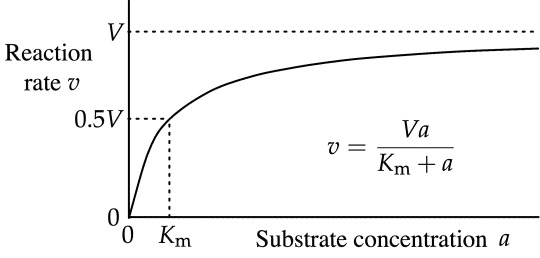
Patreon
#studyblr#notes#my notes#biochemistry#biochem#bio chem#chemistry#organic chemistry#biological chemistry#molecular biology#bio#biology#biological science#biological sciences#biochemistry notes#study guide#biochemistry study guide#biochem study guide#biochemistry flashcards#metabolism#catabolism#anabolism#molecules#organic chemicals#mcat#mcat biochem#mcat biochemistry#mcat study guide#note cards
9 notes
·
View notes
Text
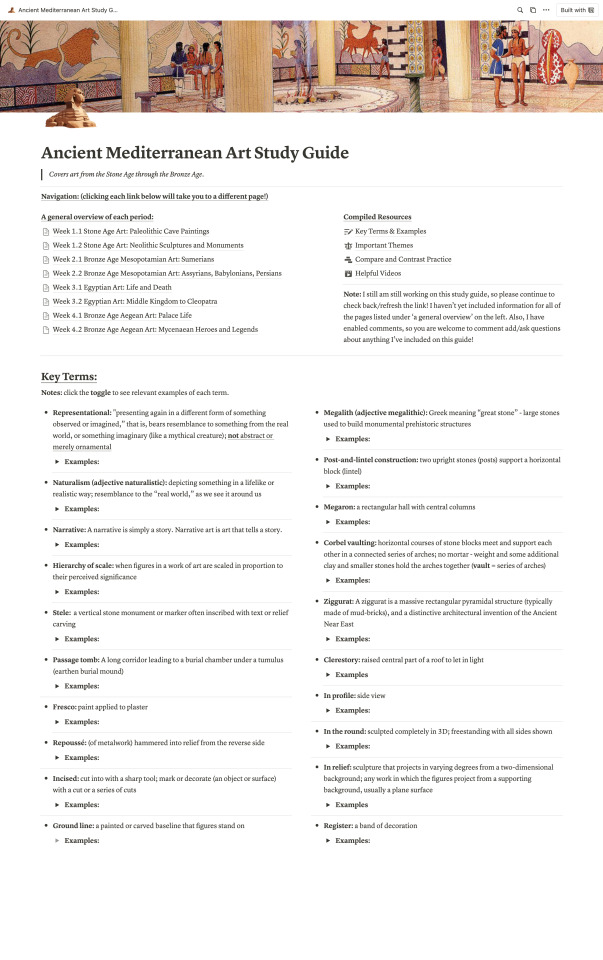
#art#greek mythology#art history#ancient art#ancient mediterranean art#greek art#roman art#bronze age#stone age#prehistoric#prehistoric art#study guide#notion#notion templates#free notion templates#free study guide#mediterranean art#graduate school#stone age art#bronze age art
48 notes
·
View notes
Text



Update!
I'm all set with my new study gears 💻 👩💻 📚
Hopefully will be back here soon (wish me luck!)
Details on the gears
Samsung Galaxy Tab S8 (with an S pen)
A bookcover keyboard
It's got an 11 inch screen and taking notes with Samsung Notes is much easier, which can be modified and rearranged any time. More updates later 📲
#studyblr#studying#med#medblr#studyspo#study inspiration#study guide#study gears#tab#galaxy tab#samsung galaxy tab s8#study movitation#tech#study technique#study tips#med student#study blog#motivation#medical student#medical studyblr#studentbyoccupation
33 notes
·
View notes